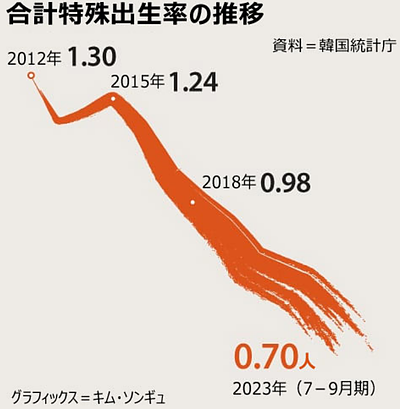
英検1級取得者によるオンライン個別指導のプロ
英語パーソナルジム HIET(ヒート)/ High Intensity English Training
- お電話での
お問い合わせ - 090-3825-5237
コラム
英文記事を読む:New York Times 韓国は消えゆくのか / 日本 対岸の火事ではない / 韓国メディア反応
2023年12月18日
NYタイムズ記事「韓国は消滅するのか」に対する
韓国メディアの悲観的反応が目立ちます。
韓国軍が維持できなくなった瞬間に北朝鮮にのまれる
というアメリカメディアの指摘に対する反発がほとんど
無いように感じました。
(筆者の情報源は英語発信記事に限ります。)
これに対して日本メディアは「対岸の火事」的反応です。
しかし突き詰めると
「人口減少問題」は「国家消滅問題」
岸田総理が高々に掲げたはずの
『異次元の少子化対策』
とは具体的には一体何だったのか。
『新しい資本主義』
などとも言っておられました。
いずれも具体的には「増税」の意だったのでしょうか。
国家のリーダーが国民の誰一人として理解できぬ文言を
言葉の定義無しに所信表明演説で用いる。
もはや悲しきコントです。
2021年10月08日
第205回国会における岸田文雄内閣総理大臣所信表明演説(全文)
岸田文雄です。
本日、衆参両院の本会議で、就任後初となる所信表明演説を行いました。所信表明演説とは、私が自らの政権で何を目指し、何を実現していくのか、国政についての方針や重点課題を国民の皆さまへ明らかにするものです。
次はイーロンマスクの旧ツイッター発信:
"日本は少子化で消滅する"
Elon Musk
@elonmusk
At risk of stating the obvious, unless something changes to cause the birth rate to exceed the death rate, Japan will eventually cease to exist. This would be a great loss for the world.
午前6:02 · 2022年5月8日
ちなみに
『対岸の火事』
を英語で言えますか?
"That's someone else's problem".
"That falls under someone else's jurisdiction."
"That's not my responsibility."
"It's up to someone else to handle that."
"That's outside of my area of concern."
"That's in someone else's hands."
"I'm not involved in that issue."
"That's someone else's affair."
"I'm not accountable for that."
"That's for someone else to take care of."
"That's beyond my purview."
"I'm not tasked with that problem."
"It's not on my plate to deal with."
"That's not within my scope."
"That's someone else's duty."
"I'm not responsible for that particular matter."
『彼らは彼らはその暴動を対岸の火事と見ていた』
They regarded the riot as something that couldn't happen here
They underestimated the riot that had nothing to do with them.
英検1級ライティング&面接の観点からは、
「少子化対策として何をすべきか」
という具体的解決策に関して論点整理すべきです。
論点整理:少子化対策として何をすべきか
There are some measures that could be taken to address declining birth rates:
Enhanced Family Support:
Increase financial assistance for families with children, including tax incentives, childcare subsidies, and parental leave policies.
Provide accessible and affordable healthcare for expecting mothers and children.
Flexible Work Policies:
Encourage companies to implement flexible work hours and remote work options to support parents in balancing work and family life.
Promote job-sharing and part-time work opportunities.
Investment in Education:
Improve and expand early childhood education programs.
Make higher education more affordable to alleviate financial burdens on families.
Community Support:
Develop community programs that provide support and resources for parents, such as parenting classes, support groups, and recreational activities for families.
Foster a culture that values and supports parenthood.
Housing and Infrastructure:
Develop affordable housing options suitable for families.
Create child-friendly infrastructure like parks, playgrounds, and recreational facilities.
Promotion of Work-Life Balance:
Encourage a cultural shift that values work-life balance and prioritizes family time.
Reduce work-related stress by promoting mental health awareness and support.
Long-Term Planning and Policies:
Implement long-term strategies to address the demographic shift, including adjusting pension and social security systems to accommodate an aging population.
These steps aim to create a more supportive environment for families and alleviate some of the pressures contributing to declining birth rates.
● 少子化:declining birth rates
● 対策:countermeasures
● 取り組み:initiatives
● 家族支援:family support
● 財政支援:financial assistance
● 拡充:expansion
● 税制優遇:tax incentives
● 保育補助:childcare subsidies
● 育児休暇:parental leave
● 出産:childbirth
● 医療制度:healthcare system
● 柔軟:flexibility
● 労働政策:labor policies
● 勤務時間:working hours
● リモートワーク:remote work
● 両立:balancing
● ジョブシェア:job sharing
● パートタイム:part-time
● 教育:education
● 投資:investment
● 幼児教育:early childhood education
● 負担軽減:burden reduction
● 地域社会:community support
● サポート:support
● 教育クラス:education classes
● サポートグループ:support groups
● レクリエーション活動:recreational activities
● 育児:child-rearing
● 尊重:respect
● 地域:community
● 公園:parks
● 遊び場:playgrounds
● インフラ:infrastructure
● 住宅:housing
● オプション:options
● 文化:culture
● バランス:balance
● メンタルヘルス:mental health
● 啓発:awareness
● 長期的:long-term
● 計画:planning
● 政策:policies
● 人口構造:demographic structure
● 変化:shift
● 年金:pension
● 社会保障制度:social security system
● 調整:adjustment
● 将来:future
● 支援環境:supportive environment
● 要因:factors
● 緩和:alleviation
家族支援の拡充:
子育て世帯への財政支援の増額。税制優遇や、保育補助、育児休暇政策の拡充など。
出産を控えた母親や子供へのアクセスしやすい、手頃な医療制度の提供。
柔軟な労働政策:
企業に柔軟な勤務時間やリモートワークの導入を奨励し、仕事と家族生活の両立を支援。
ジョブシェアやパートタイムの仕事の機会を増やす。
教育への投資:
幼児教育プログラムの充実と拡大。
高等教育の負担軽減を図り、子育て家庭の経済的負担を軽くする。
地域社会のサポート:
親向けの教育クラスやサポートグループ、家族向けのレクリエーション活動など、親を支援する地域プログラムの開発。
育児を尊重し、支援する文化の育成。
住宅とインフラの整備:
子育て世帯に適した手頃な住宅オプションの開発。
公園や遊び場、レクリエーション施設など、子供に適したインフラの整備。
仕事と生活のバランスの促進:
仕事と家族の時間を重視する、仕事と生活のバランスを尊重する文化の醸成。
メンタルヘルスの啓発とサポートを推進し、仕事関連のストレスを軽減する。
長期的な計画と政策:
人口構造の変化に対応した、年金や社会保障制度の調整など、将来を見据えた対策の実施。
米NYタイムズ「韓国、黒死病の時より人口減少が深刻」
米紙コラム「韓国は消滅するのか」世界史上最悪感染症期に例える
Chosunonline.com
2023/12/04
Columnist Ross Douthat of The New York Times published a column with the headline "Is South Korea Vanishing?" on the 2nd (local time). He stated, "If South Korea maintains its current birth rate, it will experience a more significant population decline than medieval Europe, which was struck by the Black Death (Plague). South Korea represents a research subject that epitomizes the population decline issue faced by advanced countries."
He likened South Korea's declining birth rate problem to the "Plague," considered the worst pandemic in world history during the Middle Ages.
[Table] Trends in South Korea's Total Fertility Rate
According to the population trends for September released by the South Korean Statistical Office last month, the total fertility rate for the July-September period was 0.7 children, marking a record low. South Korea's total fertility rate last year was 0.78, placing it among the lowest in the OECD member countries. The decrease in South Korea's total fertility rate from 1960 to 2021 was 86.4%, the most severe among 217 countries and regions.
Douthat mentioned, "A country sustaining such a level (total fertility rate of 0.7) means that a population of 200 people in one generation (100 couples) will decrease to 70 in the next generation. This decline is more rapid than the population decrease brought by the Black Death in 14th-century Europe." Historians estimate that during the Plague, about half of Europe's population died. He remarked, "(With a birth rate of 0.7), after two generations, a population of 200 would decrease to 25, similar to the population decline caused by the fictional 'Super Influenza' in Stephen King's novel 'The Stand.'"
Experts are concerned that the impact of "extreme low fertility" will soon affect Korean society at large. In fact, it's estimated that next year's incoming first graders (born in 2017) will be the first in Korean history to fall below 400,000. According to the Statistical Office, the number of births, which was 406,243 in 2016, decreased by nearly 50,000 to 357,771 in 2017. The number of new first graders was about 650,000 in 2004 but is expected to decrease by over 40% in the past 20 years. There were 145 schools nationwide without any new students this year, a 27% increase from the previous year's 114 schools. It's projected that next year's kindergarten newcomers will also drop below 200,000 for the first time in history.
Professor Eun Ki-se of Seoul National University stated on the 2nd, "If the population rapidly decreases, we won't be able to allocate healthcare funds for the treatment of the elderly under health insurance, and even pension reform will face inevitable limitations. Extreme low fertility is not just a population issue but a national security issue risking the country's disappearance." He added, "If we don't establish a 'Population Security Department' with a vice-premier level addressing the low fertility issue, we might face a 'disastrous situation' within 10 years."
● olumnist: コラムニスト
● Ross Douthat: ロス・ドゥザット
● the New York Times: ニューヨーク・タイムズ
● is South Korea vanishing?: 韓国は消滅するのか?
● birth rate: 出生率
● Black Death: 黒死病(ペスト)
● population decline: 人口減少
● Medieval Europe: 中世ヨーロッパ
● total fertility rate: 合計特殊出生率
● South Korean Statistical Office: 韓国統計庁
● OECD member countries: 経済協力開発機構(OECD)加盟国
● plague: ペスト
● extreme low fertility: 超少子化
● Seoul National University: ソウル大学
● health insurance: 健康保険
● pension reform: 年金改革
● population security department: 人口安保部
米ニューヨーク・タイムズ(NYT)のコラムニスト、ロス・ドゥザット氏は2日(現地時間)、「韓国は消滅するのか」という見出しのコラムを掲載した。同氏は「韓国が現在の出生率のままなら、黒死病(Black Death=ペスト)に襲われた中世ヨーロッパ期よりさらに大幅な人口減少を経験することになるだろう。韓国は先進国が抱えている人口減少問題を代表する研究対象だ」と述べた。韓国の少子化問題を世界史上最悪の感染症とされる「中世に流行したペスト」に例えたものだ。
【表】韓国の合計特殊出生率の推移
韓国統計庁が先月発表した「9月の人口動向」によると、7-9月期の合計特殊出生率(1人の女性が一生の間に産む子どもの数)は0.7人で、過去最低を記録した。昨年の韓国の合計特殊出生率は0.78人で、経済協力開発機構(OECD)加盟国の中でも最下位圏だ。韓国の1960年から2021年までの合計特殊出生率の減少率は86.4%で、217カ国・地域の中で最も深刻だった。
ドゥザット氏は「このような水準(合計特殊出生率0.7人)が続く国は、ある世代の200人の人口(100組の夫婦)が次の世代には70人に減るということだ。これは14世紀の黒死病が欧州にもたらした人口減少よりさらに急速なものだ」と書いた。学界では、当時のペストでは、最も多く見積もって欧州の人口の半分が死亡したと推定している。同氏は「(出生率0.7人なら)2世代過ぎると200人だった人口が25人以下に減る。(ホラー作家)スティーブン・キングの小説『ザ・スタンド』に出てくる仮想の『スーパー・インフルエンザ』による人口減少と同じくらいだ」と評した。
専門家らは「超少子化」の衝撃がまもなく韓国社会全般を襲うと懸念している。事実、来年の小学校新入生(2017年生まれ)は韓国史上初めて40万人を下回るものと推算されている。統計庁によると、2016年に40万6243人だった出生児数は、2017年に35万7771人となり、5万人近く減少した。小学校新入生は2004年は約65万人だったが、この20年間で40%以上も減ることになる。今年、新入生が1人もいなかった小学校は全国で145校に上る。これは前年の114校に比べ27%の増加だ。来年の幼稚園新入生も史上初めて20万人台に下がる見通しだ。
ソウル大学のウン・ギス教授は2日、「人口が急減すれば、健康保険で高齢者層の治療費を充当することができず、年金改革をしても限界が生じざるを得ない。超少子化は人口問題ではなく、国の消滅がかかっている安保問題だ」と言った。その上で、「『人口安保部』を作り、副首相級が少子化問題を担わなければ、10年以内に『災害級の事態』が起こるだろう」と語った。
英検1級ライティング&面接 予想問題 Best 21
【分析資料】
① 過去問
② 昨今の国内情勢・国内の問題
③ 昨今の世界情勢・地球規模の課題
④ the 17 sustainable development goals
⑤ 21 Lessons for The 21th Century -Noah Hariari
【注意】
具体的問題はあくあでも参考と考えてください。
英検1級ライティング・スピーキング対策では、
トピックを抽象的に捉えておくことが大切です。
具体的に捉える場合、暗記量が膨大になり、
的中する可能性も極めて低くなります。
よって、ここで挙げる21トピックを包括する議論に
対して臨機応変な対応ができる状態を作ることが
効果的対策になります。
1. Climate Change:
How might immediate global action against climate change impact industries heavily reliant on fossil fuels?
What social and economic changes could arise if urgent measures to combat climate change are not taken?
2. Universal Basic Income:
How might the implementation of universal basic income influence individuals' work ethics and economic productivity?
What economic changes could be expected if every citizen were guaranteed a basic income?
3. Lack of Female Leaders in Japan:
How might an increase in female leadership impact the overall societal perspective on gender roles in Japan?
What changes could be expected in corporate culture if more women were in leadership positions?
4. Education Resources and Support:
What improvements in educational outcomes might be seen if more resources and support were allocated to the education system?
How might enhanced educational resources influence the country's future workforce and innovation?
5. Gender Inequality Elimination:
What societal changes could arise if efforts towards eliminating gender inequality were successful?
How might persistent gender inequality affect Japan's global competitiveness and social progress?
6. Homogeneous Countries:
What advantages or disadvantages might arise for a homogeneous country seeking to adapt to a more diverse global landscape?
How might embracing diversity impact cultural identity and national unity?
7. Information Technology Benefit
What potential downsides might emerge from an overreliance on improvements in information technology?
How might different sectors of society be affected by rapid advancements in information technology?
8. Immigration Policies in Japan:
How might more lenient immigration policies influence Japan's economic growth and cultural diversity?
What challenges and benefits might Japan face by opening its doors to more immigrants?
9. Public Funds in Social Welfare:
What societal improvements might be seen if more public funds were allocated to social welfare programs?
How might increased investment in social welfare impact poverty rates and social inequality?
10. Preservation of Japanese Traditional Culture and Heritage:
What cultural and historical significance do old temples hold for Japan's identity and heritage?
How might preserving old temples contribute to tourism and cultural appreciation?
11. Effectiveness of Terrorist Movements
What ethical considerations arise when evaluating the effectiveness of terrorist movements as agents of change in society?
How might society respond to the impact of terrorism on social and political landscapes?
12. Low Birth Rate Threats:
What long-term consequences might Japan face if the low birth rate issue remains unaddressed?
How might governmental policies and societal attitudes need to change to counter the threats posed by a declining birth rate?
13. Protecting Indigenous Cultures:
What societal benefits emerge from actively preserving the cultures of indigenous peoples?
How might the loss of indigenous cultures impact the world's collective heritage and knowledge?
14. Large Corporations and Profit Motives:
What instances exist where large corporations prioritize societal benefits over profits?
How might corporate social responsibility initiatives impact the public's perception of profit-driven companies?
15. Relevance of Social Class:
In what ways does social class influence opportunities and access to resources in modern society?
How might the perception of social class impact social mobility and equality?
16. Political Correctness Necessity:
What role does political correctness play in promoting inclusivity and respectful discourse in society?
How might the absence of political correctness impact social interactions and the treatment of marginalized groups?
17. Exploitation of Workers in Developing World:
How might increased regulations and oversight impact the working conditions in developing nations?
What global economic shifts could occur if the exploitation of workers in the developing world is curtailed?
18. Limits on Freedom of Speech:
What ethical considerations arise when debating the imposition of limits on freedom of speech?
How might restricting freedom of speech impact societal discourse and the exchange of ideas?
19. Legalized Gambling's Economic Impact:
How might legalized gambling contribute to or detract from a country's economic growth and revenue streams?
What social implications arise from widespread legalized gambling within a society?
20. Fighting Piracy on Open Seas:
How might enhanced international cooperation combat piracy's economic and security threats on the open seas?
What challenges and obstacles exist in effectively policing and curtailing piracy?
21. World Without Religious:
What societal and geopolitical changes might be required to achieve a world devoid of religious conflict?
How might the absence of religious conflict impact international relations and cultural interactions?
1. Climate Change:
気候変動に対する即時の世界的な行動が、化石燃料に大きく依存する産業にどのような影響を与えるか?
緊急の気候変動対策が取られない場合、どのような社会的経済的変化が生じる可能性があるか?
2. Universal Basic Income:
基本的所得保障の導入が個人の労働倫理や経済生産性にどのような影響を与えるか?
市民全員が基本所得を保証された場合、どのような経済的変化が期待されるか?
3. Lack of Female Leaders in Japan:
女性リーダーの増加が、日本のジェンダーロールに対する社会全体の見方にどのような影響を与えるか?
女性がリーダーシップのポジションにいる場合、企業文化にどのような変化が期待されるか?
4. Education Resources and Support:
もっと多くのリソースとサポートが教育システムに割り当てられれば、教育の成果にどのような改善が見られるか?
教育リソースの向上が、国の将来の労働力とイノベーションにどのように影響するか?
5. Gender Inequality Elimination:
ジェンダーの不平等を撤廃するための取り組みが成功した場合、どのような社会的変化が生じるか?
持続的なジェンダーの不平等が日本の国際競争力や社会的進歩にどのような影響を与えるか?
6. Homogeneous Countries:
多様性のあるグローバルな環境に適応しようとする同質性のある国には、どのような利点や欠点が生じるか?
多様性を受け入れることが文化的アイデンティティや国家の結束にどのように影響するか?
7. Information Technology Benefits:
情報技術の改善に過度に依存することから生じる可能性のあるマイナス面は何か?
異なる社会セクターが急速な情報技術の進歩にどのように影響を受けるか?
8. Immigration Policies in Japan:
もっと寛容な移民政策が日本の経済成長や文化的多様性にどのような影響を与えるか?
より多くの移民を受け入れることで日本が直面する課題と利点は何か?
9. Public Funds in Social Welfare:
社会福祉プログラムにより多くの公的資金が割り当てられれば、どのような社会的改善が見られるか?
社会福祉への投資が貧困率や社会的不平等にどのように影響するか?
10. Preservation of Japanese Traditional Culture and Heritage:
古い寺院が日本のアイデンティティと遺産に対して持つ文化的・歴史的な意義は何か?
古い寺院を保存することが観光や文化的鑑賞にどのように貢献するか?
11. Effectiveness of Terrorist Movements:
テロリスト運動の効果を社会の変化のエージェントとして評価する際に生じる倫理的考慮事項は何か?
テロリズムが社会や政治の景観に与える影響に対して社会はどのように反応するか?
12. Low Birth Rate Threats:
低出生率問題が未解決のままで日本が直面する長期的な影響は何か?
少子化がもたらす脅威に対抗するために、政府の政策や社会の態度がどのように変わる必要があるか?
13. Protecting Indigenous Cultures:
先住民族の文化を積極的に保存することから生じる社会的利益は何か?
先住民文化の喪失が世界の共同遺産と知識にどのように影響するか?
14. Large Corporations and Profit Motives:
大企業が利益よりも社会的利益を優先する事例は何か?
企業の社会的責任イニシアチブが、利益志向の企業に対する一般の認識にどのように影響するか?
15. Relevance of Social Class:
社会的階級が現代社会で機会やリソースへのアクセスにどのような影響を与えるか?
社会的階級の認識が社会的流動性や平等にどのように影響するか?
16. Political Correctness Necessity:
政治的正確さが社会で包括性と尊重ある対話を促進するのにどのような役割を果たすか?
政治的正確さの欠如が社会的交流やマージナライズされたグループの扱いにどのように影響するか?
17. Exploitation of Workers in Developing World:
規制や監督の強化が途上国の労働条件にどのような影響を与えるか?
途上国での労働者の搾取が抑制された場合、どのような世界経済の変化が起こるか?
18. Limits on Freedom of Speech:
言論の自由に制限を設ける議論における倫理的考慮事項は何か?
言論の自由を制限することが社会的対話やアイデアの交換にどのように影響するか?
19. Legalized Gambling's Economic Impact:
合法化された賭博が国の経済成長や収入にどのような影響を与えるか?
社会全体での合法化されたギャンブルから生じる社会的影響は何か?
20. Fighting Piracy on Open Seas:
国際的協力の強化がオープンシーでの海賊行為の経済的・安全保障上の脅威と戦うのにどのように役立つか?
海賊行為を効果的に取り締まるための課題や障害は何か?
21. World Without Religious Conflict:
宗教的な衝突のない世界を実現するにはどのような社会的・地政学的な変化が必要か?
宗教的な衝突の欠如が国際関係や文化的交流にどのように影響するか?
英検1級 5大テーマ
(1). テクノロジーと社会
「人々の仕事へのテクノロジーの影響」
「情報技術の進化とメディア」
(2). 倫理とビジネス
「企業の倫理と利益」
「監視カメラとプライバシー」
(3). 社会と政治
「国際問題と国内問題の優先順位」
「都市化とその影響」
(4). 価値観と道徳
「道徳的価値観の現代における変化」
「ジェンダー平等と女性リーダーシップ」
(5). 環境問題
「生物多様性の喪失と環境への影響」
「気候変動と政府の役割」
関連するコラム
- 英文記事を読む:中国の原子力潜水艦 2023-11-09
- 英文記事を読む:日本のGDP ドイツに抜かれる 2023-11-18
- 英文記事を読む:大阪万博 ★英国 Fianancial Times がツッコミ入れる ★準備の見世物ショー 2023-12-22
- 英文記事を読む:文科省調査 「発達障害 8.8%」と言うが「発達障害」の定義が。。。 2023-12-22
- 英文記事を読む:自動車輸出 日本を抜いて中国が世界一 2023-11-30
コラムのテーマ一覧
カテゴリから記事を探す
TEX 二井原プロへの
お問い合わせ
マイベストプロを見た
と言うとスムーズです
勧誘を目的とした営業行為の上記電話番号によるお問合せはお断りしております。











